WORKS
教員(および将来的にはゼミ生も!)による研究成果のリスト
2025
- Party Politics
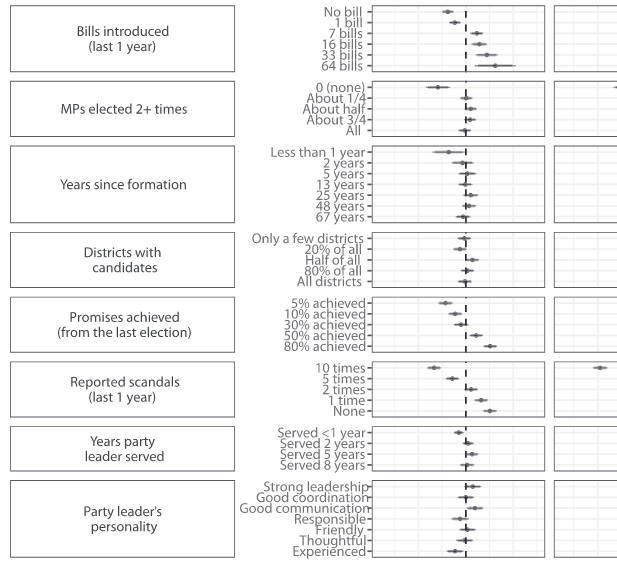 What Brings You to the Party? Voter Preferences on Parties through Policy and Valence DynamicsJordan Hamzawi, Gento Kato, and Masahisa EndoParty Politics, May 2025
What Brings You to the Party? Voter Preferences on Parties through Policy and Valence DynamicsJordan Hamzawi, Gento Kato, and Masahisa EndoParty Politics, May 2025Recent studies of party politics suggest that non-policy attributes, or valence, of political parties significantly influence voter decision-making. However, no research to date has established exactly what types of valence matter and how they interact with parties’ policy platforms. This study therefore conducted a conjoint experiment in Japan and found that voters care more about party valence attributes with respect to presence, power, and legislative productivity, as well as the prevalence of scandals, compared to the level of continuity and experience. This pattern persists regardless of electoral system and partisanship. The results also imply that valence is not a substitute for policy and that the effects of valence and policy behave additively. These findings paint a picture of electoral competition centered on both a party’s policy offerings and its ability to meaningfully engage in the legislature rather than its continuing existence or the prevalence of incumbent members.
@article{Hamzawi2025whbr, title = {What Brings You to the Party? {{Voter}} Preferences on Parties through Policy and Valence Dynamics}, shorttitle = {What Brings You to the Party?}, author = {Hamzawi, Jordan and Kato, Gento and Endo, Masahisa}, year = {2025}, month = may, journal = {Party Politics}, publisher = {SAGE Publications Ltd}, doi = {10.1177/13540688251339631}, } - POQ
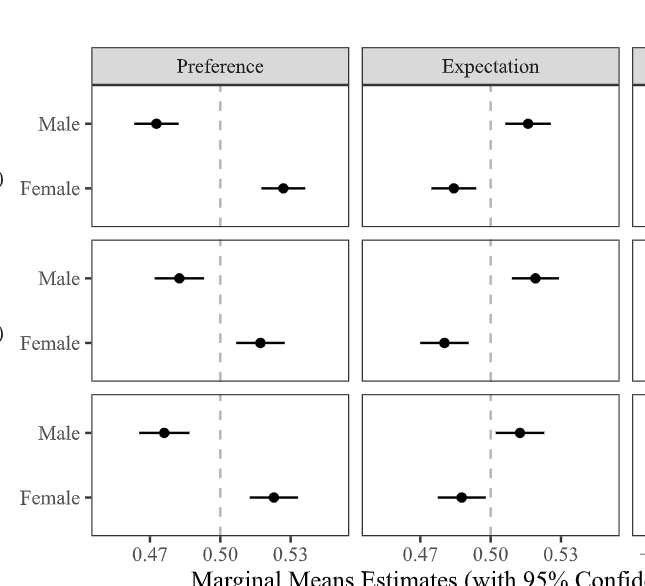 The Preference-Expectation Gap in Support for Female Candidates: Evidence from JapanGento Kato, Fan Lu, and Masahisa EndoPublic Opinion Quarterly, May 2025
The Preference-Expectation Gap in Support for Female Candidates: Evidence from JapanGento Kato, Fan Lu, and Masahisa EndoPublic Opinion Quarterly, May 2025Gender disparities in Japanese government are consistently high, but evidence of voter bias against female politicians is mixed. We argue that this discrepancy arises because some researchers measure Japanese voters’ first-order preferences (who they personally support) while other researchers measure Japanese voters’ second-order preferences (who they expect other voters to support). We call this gap between voters’ own preferences and expectations regarding others’ preferences the preference-expectation gap. Since this gap is a key mechanism of strategic discrimination, we test our argument using an experimental design modelled after research on strategic discrimination in the 2020 US Democratic primary elections. Based on two online conjoint survey experiments in Japan, our findings demonstrate the presence of a preference-expectation gap in Japanese public opinion on female politicians. Exploratory analyses of moderation effects reveal that female participants and those with more liberal views toward gender roles have larger preference-expectation gaps.
@article{Kato2025prga, title = {The {{Preference-Expectation Gap}} in {{Support}} for {{Female Candidates}}: {{Evidence}} from {{Japan}}}, author = {Kato, Gento and Lu, Fan and Endo, Masahisa}, year = {2025}, month = may, journal = {Public Opinion Quarterly}, doi = {10.1093/poq/nfaf002}, }
2024
- R&P
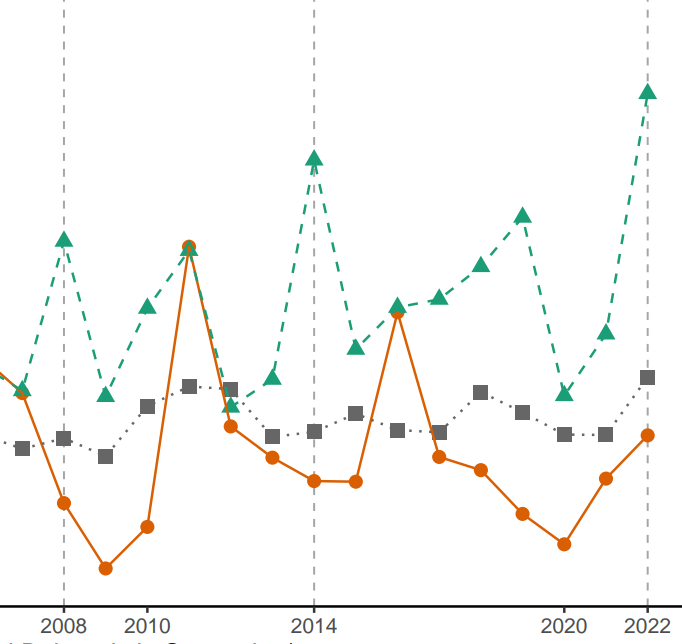 Russian Adventurism and Central Asian Leaders’ Foreign Policy Rhetoric: Evidence from the UN General Debate CorpusBimal Adhikari, and Gento KatoResearch & Politics, Apr 2024
Russian Adventurism and Central Asian Leaders’ Foreign Policy Rhetoric: Evidence from the UN General Debate CorpusBimal Adhikari, and Gento KatoResearch & Politics, Apr 2024How do smaller states position themselves in the biggest diplomatic forum when a regional power with which they share deep economic and political ties is engaged in foreign adventurism with its neighbors? We answer this question by examining how the five Central Asian countries (the “-stans”) have crafted their United Nations General Assembly (UNGA) speeches in the aftermath of three recent instances of Russian foreign adventurism: Russo-Georgian War in 2008, Crimea Annexation in 2014, and the Russo-Ukrainian War in 2022. Our quantitative assessment of the appearance of sovereignty frames in the UN General Debate corpus from 1992 to 2022 suggests that while historically the Central Asian states have refrained from invoking themes related to sovereignty, the recent full-scale invasion of Ukraine has shifted these countries’ position, whereby they no longer keep themselves away from discussions related to state sovereignty. The fact that Central Asian countries are willing to engage in discussions that are not liked by Russia suggests that these countries are attempting to make their concerns about an aggressive regional power known to the global community.
@article{Adhikari2024ruad, title = {Russian Adventurism and {{Central Asian}} Leaders' Foreign Policy Rhetoric: {{Evidence}} from the {{UN General Debate}} Corpus}, shorttitle = {Russian Adventurism and {{Central Asian}} Leaders' Foreign Policy Rhetoric}, author = {Adhikari, Bimal and Kato, Gento}, year = {2024}, month = apr, journal = {Research \& Politics}, volume = {11}, number = {2}, doi = {10.1177/20531680241254190}, }
2023
- IJPOR
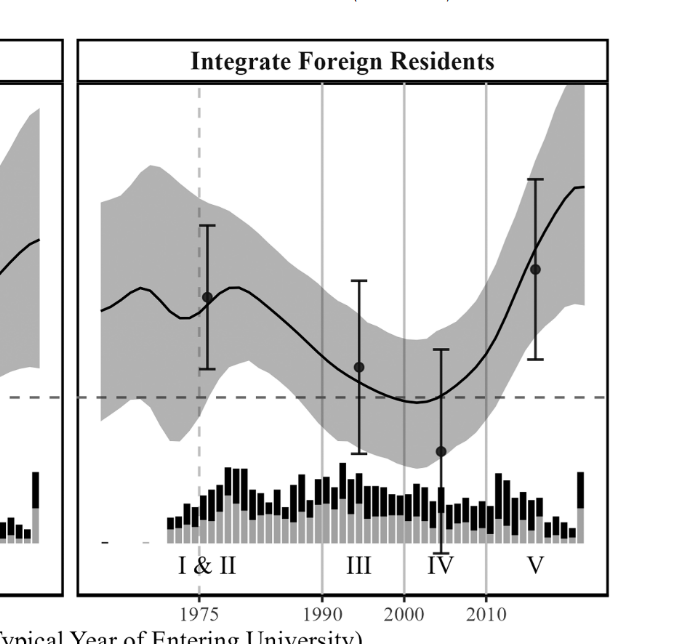 The Relationship Between University Education and Pro-Immigrant Attitudes Varies by Generation: Insights From JapanGento Kato, and Fan LuInternational Journal of Public Opinion Research, Oct 2023
The Relationship Between University Education and Pro-Immigrant Attitudes Varies by Generation: Insights From JapanGento Kato, and Fan LuInternational Journal of Public Opinion Research, Oct 2023While there is lively debate on whether higher education cultivates support for immigrants in North America and Western Europe, there is little discussion on the extent to which the relationship generalizes beyond these continents. In light of Japan’s growing reliance on foreign workers, increase in university enrollment rates, as well as efforts to internationalize universities over the last half-century, we explore the relationship between university education and Japanese attitudes toward immigrants. Using two surveys asking an overlapping set of questions in 2009 and 2022, we find the relationship between university education and pro-immigrant attitudes varies by generation. Otherwise positive connections are significantly weakened for Japanese who entered universities in the 1990s through 2000s. Even though Japan is a modern democracy with well-developed higher education institutions, these institutions do not always correlate with more supportive attitudes toward immigrants. Our findings underscore the dynamic nature of higher education’s role in shaping public opinion outside of North America and Western Europe.
@article{Kato2023reun, title = {The {{Relationship Between University Education}} and {{Pro-Immigrant Attitudes Varies}} by {{Generation}}: {{Insights From Japan}}}, shorttitle = {The {{Relationship Between University Education}} and {{Pro-Immigrant Attitudes Varies}} by {{Generation}}}, author = {Kato, Gento and Lu, Fan}, year = {2023}, month = oct, journal = {International Journal of Public Opinion Research}, volume = {35}, number = {4}, issn = {1471-6909}, doi = {10.1093/ijpor/edad027}, }
2022
-
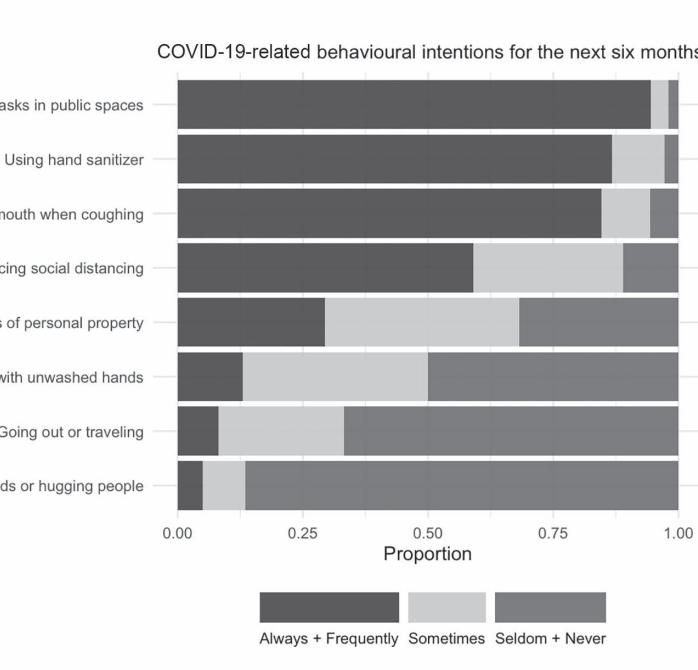 Social Values and Mask-wearing Behaviour During the COVID-19 Pandemic in JapanMasahisa Endo, and Gento KatoIn Public Behavioural Responses to Policy Making during the Pandemic: Comparative Perspectives on Mask-Wearing Policies , Nov 2022
Social Values and Mask-wearing Behaviour During the COVID-19 Pandemic in JapanMasahisa Endo, and Gento KatoIn Public Behavioural Responses to Policy Making during the Pandemic: Comparative Perspectives on Mask-Wearing Policies , Nov 2022@incollection{Endo2022sova, author = {Endo, Masahisa and Kato, Gento}, title = {Social Values and Mask-wearing Behaviour During the COVID-19 Pandemic in Japan}, editor = {Suzuki, Noriko and Mellet, Xavier and Annaka, Susumu and Endo, Masahisa}, booktitle = {Public Behavioural Responses to Policy Making during the Pandemic: Comparative Perspectives on Mask-Wearing Policies}, publisher = {Routledge}, year = {2022}, month = nov, } - 年報政治学
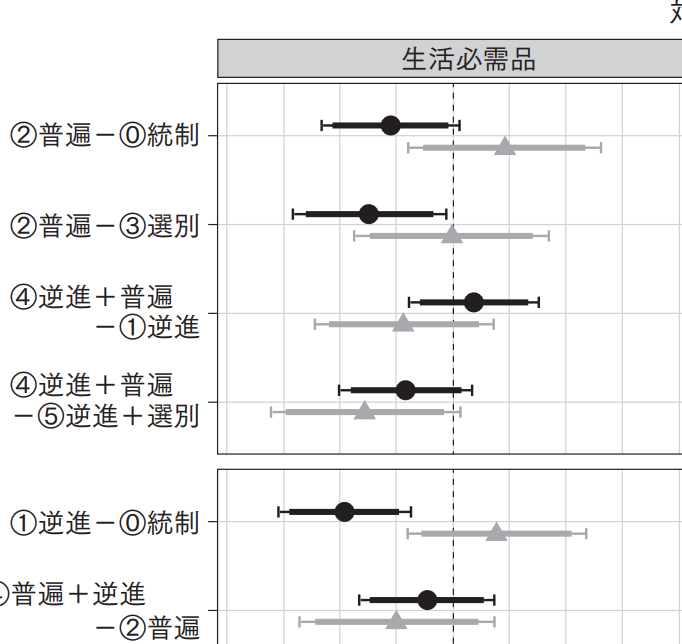 福祉国家に対する態度決定要因としての普遍的社会保障と逆進課税:消費増税に関するサーヴェイ実験安中進, 鈴木淳平, and 加藤言人年報政治学, Jun 2022
福祉国家に対する態度決定要因としての普遍的社会保障と逆進課税:消費増税に関するサーヴェイ実験安中進, 鈴木淳平, and 加藤言人年報政治学, Jun 2022本稿では、日本の有権者の間で消費税をめぐる政治対立がどのように展開しているかを明らかにする。先行研究では、受益者の幅を広げた普遍主義的給付と消費税を中心とした逆進的な課税構造を持つ福祉国家が、中・高所得者や右派からの支持を獲得し、高い平等を達成するとされる。しかしこの主張には、低所得者や左派は一様に福祉国家の拡大を支持する、という暗黙の前提がある。この前提を検証するため、消費増税に注目し、増税によって実現され得る福祉給付の性質と消費税の逆進的性質が有権者の態度形成に影響を与えるか、その影響が所得・イデオロギーによって条件づけられるかを、サーヴェイ実験を用いて検討した。結果は、福祉の普遍的な給付、または税の逆進的性質を強調すると、高所得者の間では高率な消費税がより許容される一方、低所得者の間では低率な税がより志向される傾向を示した。ただし、普遍主義と逆進性を同時に強調しても、これらの傾向は増幅されなかった。また、所得に対してイデオロギーは、実験刺激効果に対して明確な条件付け効果を持たなかった。これらの知見は、福祉・増税政策をめぐる政治対立の理解に有権者の態度形成の側面から重要な示唆を与えるものである。
@article{Annaka2022fuko_ja, title = {{福祉国家に対する態度決定要因としての普遍的社会保障と逆進課税:消費増税に関するサーヴェイ実験}}, author = {安中進 and 鈴木淳平 and 加藤言人}, year = {2022}, month = jun, journal = {年報政治学}, volume = {2022-I}, pages = {212--235}, doi = {10.7218/nenpouseijigaku.73.1_212}, yomi = {Annaka, Susumu and Suzuki, Junpei, and Kato, Gento}, } - SSQ
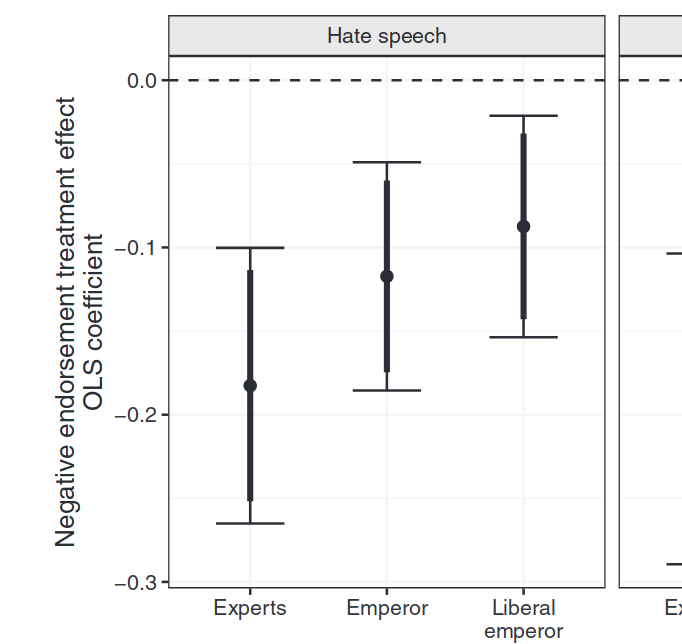 Can a Constitutional Monarch Influence Democratic Preferences? Japanese Emperor and the Regulation of Public ExpressionSusumu Annaka, and Gento KatoSocial Science Quarterly, Apr 2022
Can a Constitutional Monarch Influence Democratic Preferences? Japanese Emperor and the Regulation of Public ExpressionSusumu Annaka, and Gento KatoSocial Science Quarterly, Apr 2022Objective: This study examines whether hereditary constitutional monarchs have any influence on democratic public opinion, focusing on the case of the Japanese emperor. Methods: A survey experiment on the regulation of public expression. This issue can be framed both as left wing (i.e., the regulation of hate speech) and right wing (i.e., the regulation of publicly funded anti-nationalistic exhibitions). Taking advantage of the dual nature of the issue, we test the effects of the emperor’s endorsement on support for regulation under each ideological frame. Results: The (former) emperor’s endorsement for freedom of expression does have a cross-cutting effect and decreases support for regulation. This effect is relatively small but statistically significant. Additionally, the findings provide weak evidence for the emperor’s own ideological position conditioning his endorsement effect. Conclusion Hereditary monarchs do influence democratic public opinion, and their influence can cross-cut ideology.
@article{Annaka2022caco, title = {Can a Constitutional Monarch Influence Democratic Preferences? {{Japanese}} Emperor and the Regulation of Public Expression}, shorttitle = {Can a Constitutional Monarch Influence Democratic Preferences?}, author = {Annaka, Susumu and Kato, Gento}, year = {2022}, month = apr, journal = {Social Science Quarterly}, volume = {103}, number = {3}, pages = {699--708}, doi = {10.1111/ssqu.13152}, }
2021
- PRQ
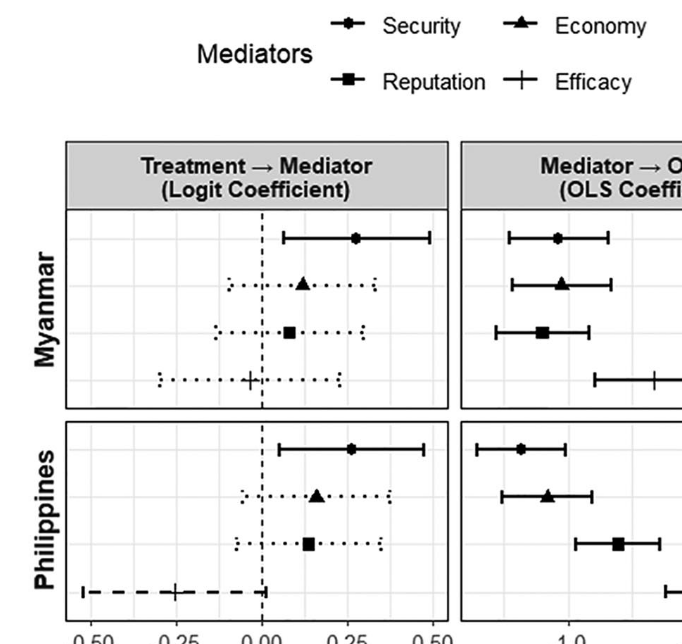 Donor Competition and Public Support for Foreign Aid SanctionsMasaru Kohno, Gabriella R. Montinola, Matthew S. Winters, and Gento KatoPolitical Research Quarterly, Mar 2021
Donor Competition and Public Support for Foreign Aid SanctionsMasaru Kohno, Gabriella R. Montinola, Matthew S. Winters, and Gento KatoPolitical Research Quarterly, Mar 2021Previous research suggests that ideology, material interests, and moral values drive citizens’ preferences over foreign aid policy. Little attention has been paid to how perceptions of the international environment affect these preferences. We examine the extent to which citizens in a traditional donor country consider donor competition when deciding whether to impose aid sanctions on governments engaged in human rights violations. Employing an information experiment conducted among Japanese adults, we find that the prospect of another donor ready to act as a substitute aid-provider reduces support for the use of aid sanctions. This effect runs most strongly through a pathway privileging security concerns, and the effect is larger among respondents who have preexisting concerns about the other donor. These results highlight the way in which public desires for foreign aid to bring about material returns can hinder a government’s ability to use aid to promote good governance ends.
@article{Kohno2021doco, title = {Donor {{Competition}} and {{Public Support}} for {{Foreign Aid Sanctions}}}, author = {Kohno, Masaru and Montinola, Gabriella R. and Winters, Matthew S. and Kato, Gento}, year = {2021}, month = mar, journal = {Political Research Quarterly}, volume = {74}, number = {1}, pages = {212--227}, doi = {10.1177/1065912919897837}, }
2020
- 選挙研究
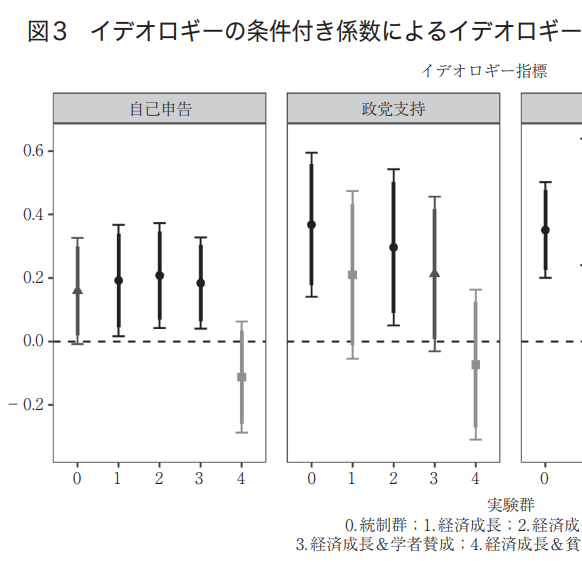 日本における「ねじれ」た金融緩和選好を説明する:イデオロギーと政策選好の関係に情報環境が与える影響の実験的検証加藤言人, and 安中進選挙研究, Dec 2020
日本における「ねじれ」た金融緩和選好を説明する:イデオロギーと政策選好の関係に情報環境が与える影響の実験的検証加藤言人, and 安中進選挙研究, Dec 2020特定の政策において、日本で「左派」や「右派」と呼ばれる政党やその支持者は、欧米における左派や右派とは逆の「ねじれ」た選好を持つことが指摘されてきた。特に金融緩和政策では、緩和拡大に対し、欧米では左派が右派に比べて積極的な傾向がある一方で、日本では左派が反対する動きが根強い。この要因に関しては様々な議論があるが、経験的な検証は行われていない。本稿では日本の有権者を対象にサーベイ実験を行い、情報環境の側面からイデオロギーと金融緩和選好の関係を規定する要因を探る。実験では、特に貧困削減フレームと経済学者の賛成意見が同時に提示された条件下で、左派が右派と同程度かそれ以上に金融緩和を支持する傾向が見られた。結果は、日本におけるイデオロギーと政策選好の関係が欧米とは異なる背景について、情報環境が重要な役割を果たしていることを示唆している。
@article{Kato2020niok_ja, title = {日本における「ねじれ」た金融緩和選好を説明する:イデオロギーと政策選好の関係に情報環境が与える影響の実験的検証}, author = {加藤言人 and 安中進}, year = {2020}, month = dec, journal = {選挙研究}, volume = {36}, number = {2}, pages = {151--167}, doi = {10.14854/jaes.36.2_151}, } - JTP
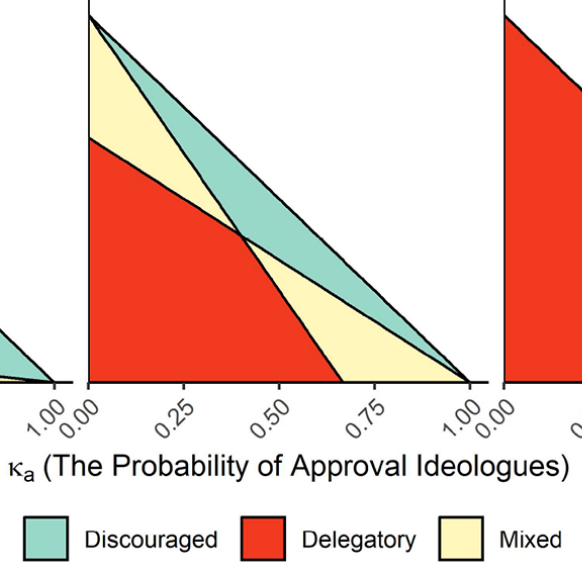 When Strategic Uninformed Abstention Improves Democratic AccountabilityGento KatoJournal of Theoretical Politics, Jul 2020
When Strategic Uninformed Abstention Improves Democratic AccountabilityGento KatoJournal of Theoretical Politics, Jul 2020The recent development in formal studies of elections produced two sets of findings that question the custom to treat voter information as a prerequisite for competent democratic decision-making. One argues that uninformed abstention is an effective strategy to approximate informed electoral outcome, and another suggests that uninformed voters may motivate strategic political elites to improve accountability. This article bridges and extends these two findings by analyzing strategic incentives in the comprehensive voting model with abstention and its connection with electoral accountability. The proposed model offers a contextual explanation for two contrasting logic in uninformed abstention, delegation and discouragement, and shows that uninformed voting with abstention sometimes improves accountability. Furthermore, uninformed abstention is more effective in generating democratically preferred outcome under delegatory than discouraged context. The results make a significant addition to the existing accountability literature by providing a more general mechanism by which less voter information improves policy outcomes.
@article{Kato2020whst, title = {When Strategic Uninformed Abstention Improves Democratic Accountability}, author = {Kato, Gento}, year = {2020}, month = jul, journal = {Journal of Theoretical Politics}, volume = {32}, number = {3}, pages = {366--388}, doi = {10.1177/0951629820926699}, }
2014
- JJPS
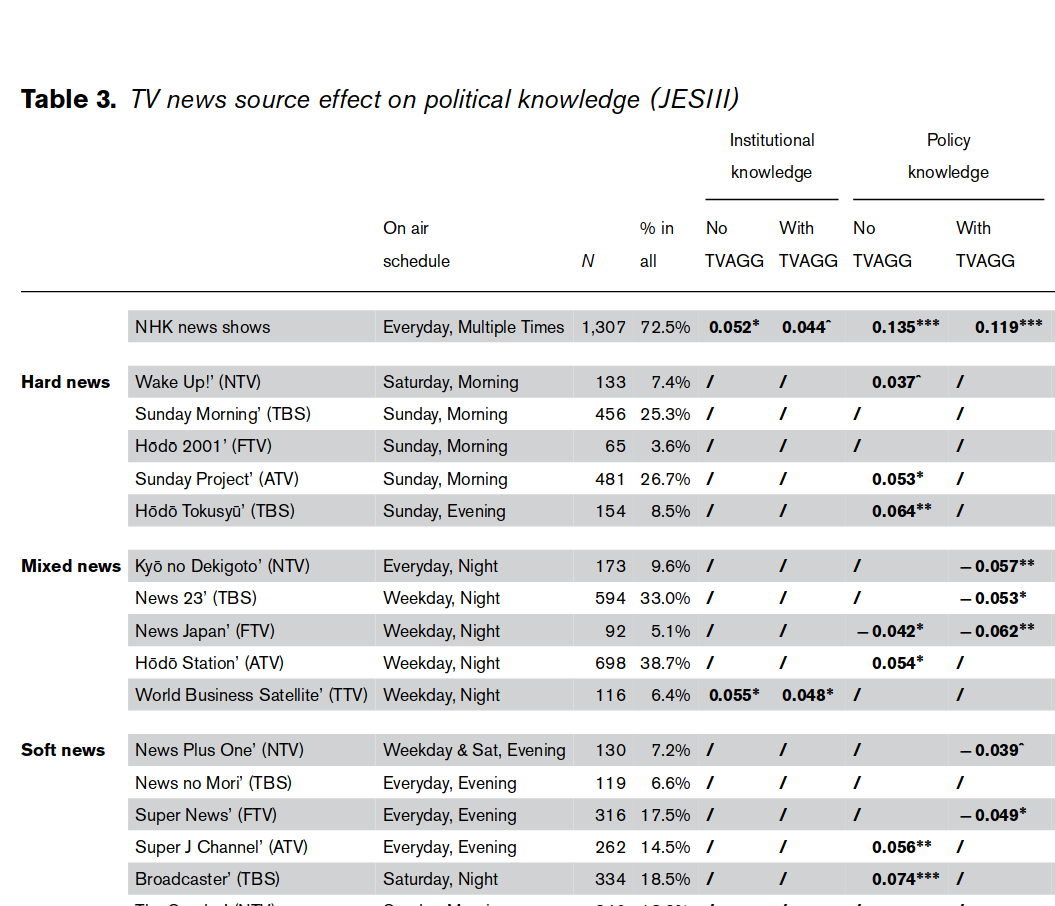 Does NHK Make You Smarter (and Super News Make You Softer)? An Examination of Japanese Political Knowledge and the Potential Influence of TV NewsChristian Collet, and Gento KatoJapanese Journal of Political Science, Mar 2014
Does NHK Make You Smarter (and Super News Make You Softer)? An Examination of Japanese Political Knowledge and the Potential Influence of TV NewsChristian Collet, and Gento KatoJapanese Journal of Political Science, Mar 2014A fundamental component of liberal democracy– citizen knowledge– has only recently been examined in Japan; rarer still are assessments of the impact of media consumption on political awareness. In this paper, we utilize two recent sources ? the Japanese Election Studies III (JESIII) and GLOPE2005 ? to address two related questions: (1) what factors influence Japanese political knowledge? and (2) is the changing media environment in Japan having an influence on what citizens know about political affairs? With regard to the first question, we find, in line with previous studies in the US context, that knowledge is explained by education, gender, and politically impinged employment as base factors, with interest, efficacy, and civic duty playing a role as second-stage behavioral factors. Evidence of other traits presumed to distinguish the more informed Japanese ? dissatisfaction with politics and community mobilization context (living in urban areas, districts with higher voter turnout, and having larger social networks ? remains mixed. Regarding the second question, we find that the effects of media exposure on knowledge vary. Where the GLOPE2005 finds an influence of regular newspaper reading, the JESIII indicates that watching a TV news program ‘often’ also boosts knowledge. The JESIII results reveal further that, ceteris paribus, regular exposure to NHK contributes to higher levels of knowledge at a rate that is comparable to a one unit increase in educational attainment. Conversely, we find that softer news programs (e.g., Fuji TV’s Super News) have a depressive effect that appears to decrease knowledge as exposure accumulates. The direction of the causal arrow is not entirely clear. At the same time, our findings lend credence to previous work that raises concerns about the ‘infotainization’ of Japanese (and US) news programming (e.g., Taniguchi, 2007; Prior, 2005). Rather than demystifying or democratizing Japanese politics, softer programs may simply be perpetuating extant gaps between elites and the public.
@article{Collet2014donh, title = {Does {{NHK}} Make You Smarter (and Super News Make You Softer)? {{An}} Examination of {{Japanese}} Political Knowledge and the Potential Influence of {{TV}} News}, author = {Collet, Christian and Kato, Gento}, year = {2014}, month = mar, journal = {Japanese Journal of Political Science}, volume = {15}, number = {01}, pages = {23--50}, doi = {10.1017/S1468109913000339}, }